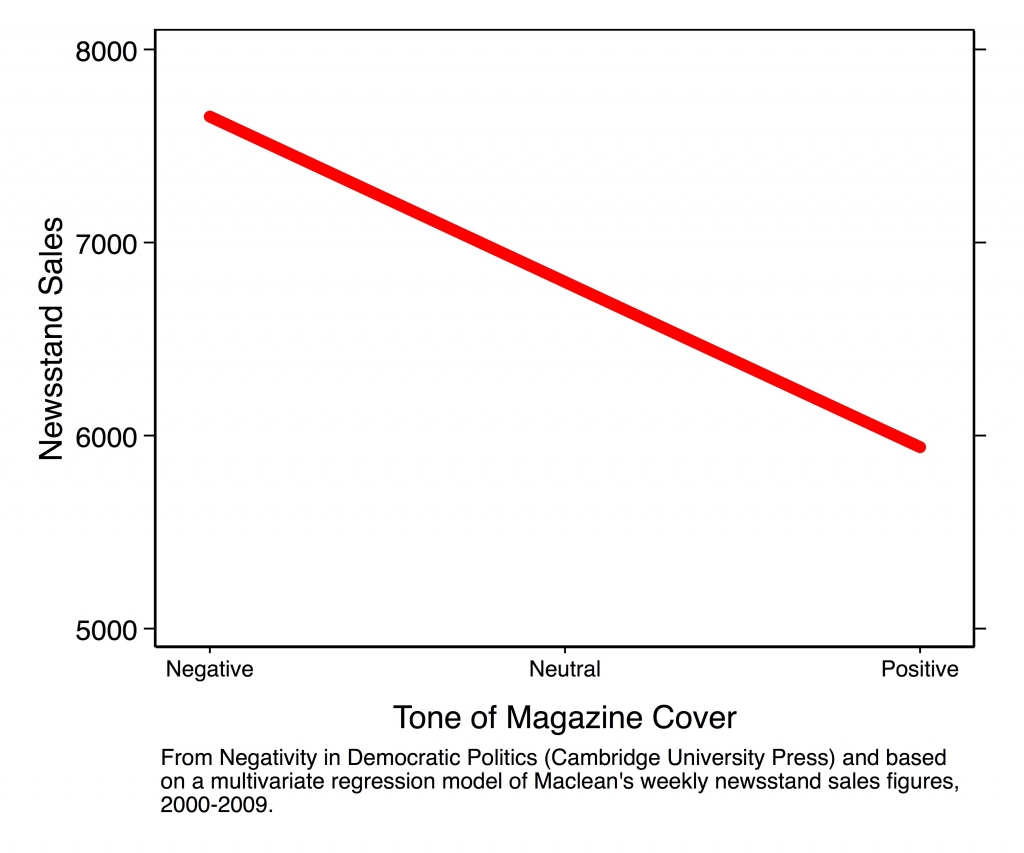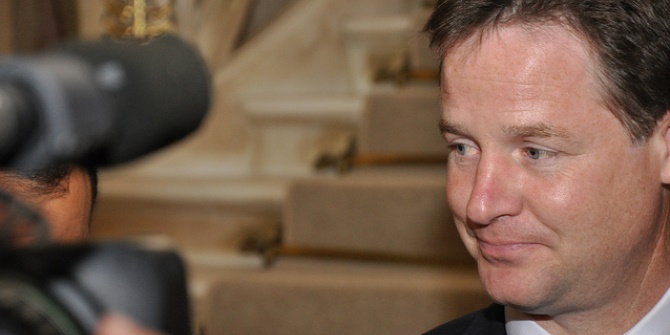 A growing body of evidence illustrates the human tendency to prioritise negative over positive news content. But why is this? Stuart Soroka suggests that humans may neurologically or physiologically predisposed towards focusing on negative information because the potential costs of negative information far outweigh the potential benefits of positive information.
A growing body of evidence illustrates the human tendency to prioritise negative over positive news content. But why is this? Stuart Soroka suggests that humans may neurologically or physiologically predisposed towards focusing on negative information because the potential costs of negative information far outweigh the potential benefits of positive information.
A recent article by Arianna Huffington argues for the importance – and popularity – of positive news. Huffington draws in part on recent work suggesting that positive stories are more likely to be shared on social networks. This trend in sharing, she suggests, provides evidence that the “if it bleeds, it leads” approach to gaining audiences is misguided. News readers, she argues, want more positive news content.
Sharing news content on social media is a fundamentally different thing from selecting and reading articles, however. (Indeed, the study on which Huffington relies recognises this.) Even as we may tend to forward positive material via social media, our news-reading habits may still prioritise negative information. There is after all a growing body of evidence illustrating the human tendency to prioritise negative over positive news content.
The behaviour of newspapers and programmes offers one obvious clue – news agencies seek audiences, after all, and experience (and sales) points towards the value of negative information. For instance, and as the figure below illustrates, newsstand magazine sales increase by roughly 30 per cent when the cover is negative rather than positive. It is no surprise, then, that a “good news day” resulted in a 66 per cent decrease in readership in an online Russian newspaper. Indeed, other research suggests that even when participants say that they would like more positive news, they still select online news stories that are predominantly negative. Even as emails and Facebook feeds highlight good, our news consumption habits still prioritise information that is negative.
Figure 1: The relationship between the tone of magazine covers and sales
But why do we pay more attention to negative news than to positive news? Answering this question (at least in part) is the focus of “News, Politics, and Negativity,” a paper that Stephen McAdams and I recently published in Political Communication. The paper draws on work in psychology, economics, and political communications to suggest that humans may neurologically or physiologically predisposed towards focusing on negative information. The argument has its roots in an evolutionary-biological account of how humans decide what to pay attention to. It is evolutionarily advantageous to prioritise negative information, the argument goes, because the potential costs of negative information far outweigh the potential benefits of positive information. The human brain is as a consequence predisposed towards focusing on negative information.
We cannot easily prove an evolutionary story, of course. But we can examine news viewers’ psychophysiological reactions to positive and negative news content. The aim of our recent paper was to do exactly this. The paper reports results from a lab experiment in which participants view a selection of real television news stories while we monitor a number of physiological indicators, including heart rate and skin conductance. Skin conductance captures the degree to which we are sweating, which changes constantly in very small ways, and which is often used as a measure of activation or arousal. Decreased heart rate is used as a measure of attentiveness.
Our findings suggest that negative network news content, in comparison with positive news content, tends to increase both arousal and attentiveness. In contrast, positive news content has an imperceptible impact on the physiological measures we focus on. Indeed, physiologically speaking, a positive news story is not very different from the gray screen we show participants between news stories.
Our study is one of the first to demonstrate this tendency using real television news content. It thus makes very clear the implications that a negativity bias in humans’ brains has for the nature of news content. (Not to mention the nature of political and economic behaviour more generally, discussed in more detail here.) News content is predominantly negative because humans tend to be more attentive to negative information.
Whether this is a bad thing is, I believe, unclear. Focusing on negative information may be a perfectly reasonable way of managing a complex news environment. We typically need to change our behaviour, or our assessment of politicians, when something goes wrong, not when something goes right. So unless we have an unlimited amount of time to pay attention to everything, we may be well-served by focusing on the information that requires a change on our part – provided that all that negativity does not also lead to overwhelming scepticism or disengagement, of course.
The difficulty is that we do not really know the ‘appropriate’ amount of negativity. Nor do we know if there are ways to adjust our negativity biases. This may be a good avenue for comparative research, and my ongoing work with Patrick Fournier and Lilach Nir is one of a growing of studies exploring the possibility that negativity biases vary systematically across cultures, and media systems. If negativity biases shift from one country to the next, we may be able to learn something about how communications and political contexts can increase or decrease our interest in negative over positive information.
Future work might also consider the implications that social media have on the tone of the news content that we receive. If we increasingly receive news content through social media, and if social media users tend to forward positive rather than negative information, then we might expect the tone of our ‘news stream’ (all the news we receive by traditional or non-traditional means) to become more positive overall. Whether this leads to a more informed or attentive electorate is another matter, however. We may be better informed about successful policy initiatives. We may alternatively lose (even more) interest in politics.
Note: This article gives the views of the author, and not the position of the British Politics and Policy blog, nor of the London School of Economics. Please read our comments policy before posting. Featured image credit: Jon S CC BY 2.0
 Stuart Soroka is the Michael W. Traugott Collegiate Professor of Communication Studies and Political Science, and Faculty Associate in the Center for Political Studies at the Institute for Social Research, University of Michigan. His work focuses on political communication, the sources and/or structure of public preferences for policy, and the relationships between public policy, public opinion, and mass media. His most recent book is Negativity in Democratic Politics (2014, Cambridge University Press).
Stuart Soroka is the Michael W. Traugott Collegiate Professor of Communication Studies and Political Science, and Faculty Associate in the Center for Political Studies at the Institute for Social Research, University of Michigan. His work focuses on political communication, the sources and/or structure of public preferences for policy, and the relationships between public policy, public opinion, and mass media. His most recent book is Negativity in Democratic Politics (2014, Cambridge University Press).









hen you read the news, sometimes it can feel like the only things reported are terrible, depressing events. Why does the media concentrate on the bad things in life, rather than the good? And what might this depressing slant say about us, the audience?
It is simple, bad news is normally life threatening, and bad news is the most crucial information for success of projects, wars or anything in life.
To be real Good news in comparison is normally something that can be seen next week when you are not busy. Or the extra sales you made this month is going to lead to a pay rise. This type of info you do not need now it does not effect you it just might increase the amount of money you use in the bank account.
The only time good news is important is when the good news has a downfall of not being able to meet the deadline (opportunity cost).
People are only interested in bad news, they just do not want to hear anything positive.
I agree that, as animals, we are wired to focus on the negative – for survival. But, as mentioned in the article, what is the “appropriate” amount of negative based info? For our publication, we decided to focus on the positive in the community for a couple of reasons. 1. People are deciding to move to locations like our Town because of the negativity – they want out of the rat race and into open space. 2. After experimenting with both the classic news stories (mostly negative) and positive stories (mostly hyper-local, positive developments within the community), our metrics are telling us that almost nobody is reading the national / international stories – which again are typically negative in nature. We have found our readers want hyper-local, positive stories. Now, we know that the same readers are consuming the “drug arrests”, “car crashes” etc., in huge amounts, but we also know we’ve found a niche we are sticking with because our readership is growing as is our advertising. It appears that people want that “island” to go to in order to see the good in the world – and there’s a lot of it.
We tried to form a happiness group to inspire people to become happyu snf make oyjers happy too. Unhappy people preferred tp go to a local free show , a film showing other peoples miseries etc. After 3 monthe we gave up. We do it now through our poetry.group.
After the U.S. presidential elections rolled in many media and academic pundits were scratching their heads over what went wrong with polls, studies and predictions. My contention would be because media and academia are totally divorced from and out of touch with the masses. It would appear no one was closely watching facebook (I am not a fan of facebook but find it a necessary evil). The hate, negativity, and lies posted and forwarded far outweighed the positive. To the extent that secret, participation by invite only, groups (how are these accounted for in studies?) were established where people of like mind could create their own echo chambers without being bullied. The Trump supporters were especially rabid. Posts I saw receiving the most engagement, which is Facebooks profit generator, were long ugly fights that almost always involved bullying and name calling. It was a feeding frenzy that, my observation, gave people the opportunity to show the ugly they would not otherwise show, say in a public setting. The negativity was such that fake news sites proliferated and profited off of fake negative news stories.
Of note was another story getting much exposure on Facebook. The Indian protests over the Dakota pipeline at Standing Rock. This story was/is generating much interest from both the left and the right yet U.S. news media, for the longest time, barely mentioned it, if at all. I and others looked to foreign sources such as the U.K. Guardian for comprehensive coverage from a mainstream source.
There are, of course, touchy-feely posts that go viral and many people trying to figure the exact recipe for creating them for profit.
Now one could say this a subject of my friend’s list or my subjects of interest or my location, a rural highly conservative area. But it is hard to determine based on the constant manipulation of the algorithms by Facebook, which I believe would impact any analytical conclusion without Facebook’s cooperation. What is known is that large numbers of young people are leaving Facebook due to “drama” and “bullying”. Many of them are seeking sites that allow anonymity to avoid the “bullying” which speaks for itself re negativity.
As someone who has had experience working in the field of human behavior (before Facebook), my observation has been that, in the U.S. anyway, riots and fights generate more excitement than Kum by ya moments. Witness the death of the hippie and other passive lifestyles/movements and the growth of wanna-be “Bikers” and warriors who have never seen a battle.
“Nor do we know if there are ways to adjust our negativity biases.” I am sure you are aware of Facebook’s secret study, now not so secret, demonstrating that they could impact human emotion which by default can impact human behavior. Also, group think, herd behavior and mob psychology.
“If negativity biases shift from one country to the next, we may be able to learn something about how communications and political contexts can increase or decrease our interest in negative over positive information. ” You would know better than I if the Brexit and our recent election experience have commonalities that apply. Location and culture are key as positives and negatives are interchangeable. I consider racism a negative. In my area, many consider it a positive. To an extent that I believe would shock media, political and academic pundits. Which goes back to my contention that media and academia have become insulated from the streets contributing to the proliferation of bogus internet sites that will feed the masses what they want to hear, true or not. I believe this development will have severe global implications in a world where the two-minute attention span has devolved to a two-sentence and a meme attention span.
My apologies for going on. I stumbled across the article looking for info on negativity reinforcing negativity or negativity generating rewards/value, e.g. U.S. election results and it struck a chord with my contention that if the knowledge that one finds does not fit their world view, the knowledge to accommodate the world view will be created. I would end with do not dismiss sites such as Facebook. Their power is scary. With respect.
Very interesting article indeed. Thanks.
Few notes here:
So you are saying that “News content is predominantly negative because humans tend to be more attentive to negative information.” and that “The human brain is as a consequence predisposed towards focusing on negative information.” because “the potential costs of negative information far outweigh the potential benefits of positive information.” . If I didn’t miss your point here then this is what you are saying.
But is not that one, and just one reasons? I mean by arguing that this tendency can be rooted back to evolution we will lose the opportunity of studying the reasons from other sides.
I believe there are several reasons why humans tend to get alerted to negative news (although negative is a vague term and need to be better defined). My points which come from observing Syrians engagement with news feed on Facebook for the past 4 years can be categorized under the following four main categories:
1- People feel they survived when they see other negative news about others. It is the self-reminder of how lucky we are. Although this may seem mean for very short millisecond, but it happens deep inside us and this is proven in psychological literature.
2- Seriousness: its like the last pushup we take. it is the moment that differentiate exercise for entertainment and socializing and exercise to build a muscle and get in shape.
3- It is a continuous self reminder. to the sequences of hard conditions.
4- we look more human, In our own sights and in the sights of others. That said , i do not see any potential that people will stop sharing negative news on social networks giving the fact that we attend social networks for two main reasons: self expressing and social/group belonging.
…
,,,,
My research of social network Facebook for the past year i was extremely surprised to get one interesting finding . Digging for emoticons into +70,000 comments on artworks related to the Syrian revolution i could see that the smile 🙂 was the most repeated emotion. is not that surprising giving the fact that most of the artworks naturally included PAIN stories? I guess the main reason we would look for a negative story is to prove to ourselves that we are stronger than the story. We can not be consumed by the story. But we are not just consumers too. We are strong and compassionate humans.
Thanks a lot of posting this article, it made me take the time and effort to reveal and contribute.